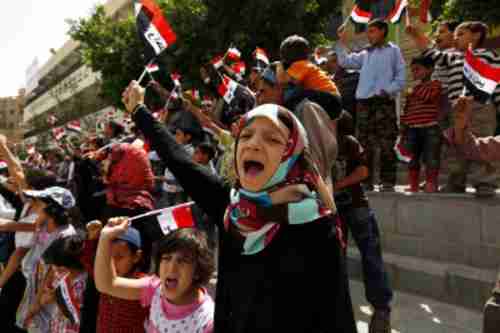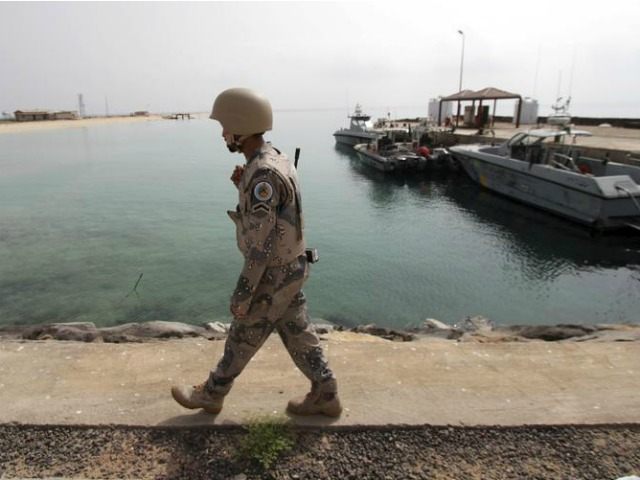This morning’s key headlines from GenerationalDynamics.com
- Saudi Arabia shoots down Scud missile from Houthis in Yemen
- Who’s causing the humanitarian crisis in Yemen?
- Europeans rescue 3,000 migrants on Saturday, fear hundreds of thousands more
Saudi Arabia shoots down Scud missile from Houthis in Yemen

Young Yemenis in anti-Saudi demonstrations in Sanaa
In a new, potentially major escalation of the war in Yemen, Iran-backed Shia Houthi militias in Yemen fired a Scud missile across the border with Saudi Arabia, targeting the King Khalid Air Base in the city of Khamis Mushait, about 100 km north of the Yemen border.
The Saudis launched two missiles from a Patriot missile battery, and shot the Scud missile down with no reported casualties.
However, the Houthis are calling it a symbolic victory, because it shows that the Saudi air strikes have not been effective, and it shows that the Houthis still have enough firepower to attack Saudi villages and bases. It is believed that the Houthis have a stockpile of some 300 Scud missiles, though some of those may have been destroyed by Saudi air strikes.
At the same time, fighting along the border between Yemen and Saudi Arabia has been increasing. The Saudis responded to the Scud missile attack by a new surge in airstrikes at Houthi targets in Yemen, along the Saudi border and in the capital city Sanaa.
As we have been describing for a long time, the Mideast is headed for a massive war of Shias versus Sunnis, Arabs versus Persians, and Jews versus Muslims. Ever since the “Arab awakening” in 2011, the Mideast has become more and more inflamed.
The United Nations has called for peace talks to begin next week. This is great news, because this will settle the Yemen war, just as previous peace talks have resolved the wars in Iraq, Syria and Ukraine. Reuters and AP and AFP
Who’s causing the humanitarian crisis in Yemen?
Everyone agrees that there is a humanitarian disaster in progress in Yemen, with nearly 80% of the population in urgent need of food, water and medical aid. But the ideological war is whether the humanitarian crisis is the fault of the Houthis or the Saudis.
According to the liberal Guardian, the Saudis are at fault:
[The humanitarian crisis] has been dramatically worsened by a naval blockade imposed by an Arab coalition with US and British backing.
Washington and London have quietly tried to persuade the Saudis, who are leading the coalition, to moderate its tactics, and in particular to ease the naval embargo, but to little effect. A small number of aid ships is being allowed to unload but the bulk of commercial shipping, on which the desperately poor country depends, are being blocked. …
The desperate shortage of food, water and medical supplies raises urgent questions over US and UK support for the Arab coalition’s intervention in the Yemeni civil war since March. Washington provides logistical and intelligence support through a joint planning cell established with the Saudi military, who are leading the campaign. London has offered to help the Saudi military effort in “every practical way short of engaging in combat”.
On western urging, Riyadh had promised to move towards “intelligence-led interdiction”, stopping and searching individual ships on which there was good reason to believe arms were being smuggled, and away from a blanket policy of blocking the majority of vessels approaching Yemeni ports. But aid agencies and shipping sources say there is little sign of any such change. UN sources say that only 15% of the pre-crisis volume of imports is getting through, and that the country depends on imports for nine-tenths of its food. …
At Al Hudaydah on Yemen’s west coast, the only major port still functioning, a trickle of humanitarian food supplies is arriving on a handful of aid ships allowed through the naval blockade each week, but many more ships are being turned away or made to wait many days to be searched for weapons.
According to the Arab News, the United Nations and the Houthis are at fault:
One source confirmed that more than 200 licensed ships were allowed to deliver aid and that not all the ships were inspected as many are believed not to be linked to the rebels. The source added that many ships are using the Djibouti port, which the United Nations — not Saudi Arabia, Egypt or the US — supervises and grants licenses accordingly.
The inspection forces may have delayed the passage of the ships but they haven’t prevented them from passing and have not confiscated their cargo. […]
The Saudi-led coalition forces know that the rebels are intentionally obstructing aid in order to stir international public opinion at the expense of the Yemeni people, whom they’ve taken hostage. Hospital operations have been disrupted due to rebels obstructing the delivery of fuel. Millions of people in several cities and towns lack drinking water because they ran out of the diesel necessary for generators to pump water. Meanwhile, the military power of the Houthis and Saleh’s forces has not been obstructed as they are stealing fuel to operate their vehicles and are in control of food storage centers. They’ve also seized aid routes in the center of the country and are transferring this aid to areas in their control.
When I asked a source as to why international organizations do not blame the Houthis and Saleh’s forces for this humanitarian crisis, he said it’s because they do not want to cut ties with them and because they fear for their employees and activities in Yemen, considering that these rebels are gangs that do not hesitate to kill whoever criticizes or defies them.
It is clear that both of these accounts are completely biased, in opposite directions.
One expects the Arab News to be biased. After all, the Arab coalition is one party to the war, and their press is going to be biased in their favor.
But the Guardian is supposed to be a mainstream media source, based in London. So why is the Guardian just as biased as the Arab News? Why does the Guardian account read like it was from the Tehran Times?
More broadly, why are all the mainstream liberal news sources — the Guardian, the NY Times, NBC News, etc., so completely biased that it’s almost impossible to trust anything they write? We know that Generation-Xers have been extremely dishonest as politicians and as bankers, so I suppose we should expect it of journalists as well.
As for mainstream conservative news sources, there are fewer choices. Fox News covers mostly American political news, which I tend to avoid. And the London Telegraph is behind a limited paywall.
My job every day in my World View column is that when I write about a subject is to read media sources from all points of view, and try to figure out who’s telling the truth. Usually I do pretty well, but it would be easier if I could depend on journalists who act like professional adults instead of screwed up children. The Guardian (London) and Arab News (Riyadh)
Europeans rescue 3,000 migrants on Saturday, fear hundreds of thousands more
Vessels from Germany, Ireland, Britain and Italy rescued over 3,400 migrants on Saturday. There were about 15 individual rescues, mostly 200-300 nautical miles south of Italy, in international waters near Libya.
According to one analyst, there’s a big surge every weekend. The reason is that the weekend starts in Libya on Thursday evening, and then there are fewer people on the streets and beaches, making it much easier for the migrant smugglers to launch their boats on Friday and Saturday. There may be thousands of migrants rescued on the weekend, but during the week, there are usually just a few hundred every day.
Europeans are bracing for an even bigger surge of migrants as the summer continues. There are reportedly 450,000 to 500,000 migrants already in Libya, waiting to make the crossing to Europe. They’ve already each paid thousands of dollars to the smugglers, and are waiting their turns to make the crossing. The migrants are put onto overcrowded boats, and they’re told to sink them as soon as they see another vessel, so that they’ll have to be rescued. Guardian (London) and Al Jazeera
KEYS: Generational Dynamics, Yemen, Saudi Arabia, Scud, Patriot Missile, Khamis Mushait, King Khalid Air Base, Houthis, Iran, Germany, Ireland, Britain, Italy, Libya
Permanent web link to this article
Receive daily World View columns by e-mail

COMMENTS
Please let us know if you're having issues with commenting.